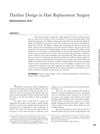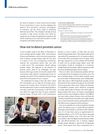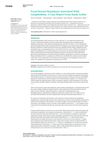November 2009 in “Hair transplant forum international” Early diagnosis and personalized treatment are crucial for managing Female Pattern Hair Loss in women.
 3 citations,
January 2018 in “BioMed Research International”
3 citations,
January 2018 in “BioMed Research International” Achieving perfect facial plastic surgery requires personalized plans, proper patient selection, advanced techniques, and ongoing surgeon education.

TrichoFoam™ is a stable option for personalized hair loss treatment with most ingredients remaining effective for 90-180 days.
 November 2023 in “ACS Applied Polymer Materials”
November 2023 in “ACS Applied Polymer Materials” The new method extracts keratin from hair faster and better, and the resulting product improves blood clotting and wound healing, with potential for personalized treatments.
 August 2023 in “GLOBAL JOURNAL FOR RESEARCH ANALYSIS”
August 2023 in “GLOBAL JOURNAL FOR RESEARCH ANALYSIS” Effective hair loss treatment requires personalized approaches and patient-provider collaboration.
227 citations,
April 2020 in “Cell” More precise, personalized therapies are needed for autoimmune diseases.
 October 2024 in “Journal of the Endocrine Society”
October 2024 in “Journal of the Endocrine Society” Managing recurrent painless thyroiditis is challenging and should be personalized based on episode frequency, severity, symptoms, and patient preferences.
 September 2024 in “Journal of the American Academy of Dermatology”
September 2024 in “Journal of the American Academy of Dermatology” The compounded topical solution is safe, stable, and effective for personalized alopecia treatment.

The study aims to create a model to improve personalized and preventive health care.
August 2021 in “Oxford University Press eBooks” New treatments for hair-pulling disorder focus on personalized approaches and combining therapies for better results.
 52 citations,
December 2000 in “Archives of Dermatological Research”
52 citations,
December 2000 in “Archives of Dermatological Research” Scalp skin barrier affects hair loss; personalized treatments needed.
 25 citations,
November 2008 in “Facial Plastic Surgery”
25 citations,
November 2008 in “Facial Plastic Surgery” Dr. Michael Beehner recommends a personalized, careful approach to hairline design in hair replacement surgery for a natural look.
 2 citations,
March 1998 in “The American Journal of Cosmetic Surgery”
2 citations,
March 1998 in “The American Journal of Cosmetic Surgery” The conclusion is that a good hairline design for hair restoration should be personalized and based on specific scalp landmarks.
4 citations,
August 2021 in “Pediatrics in review” DSDs are birth conditions causing unusual sex development, managed with personalized care and sometimes surgery, but still lack a standard treatment approach.
April 2017 in “The journal of investigative dermatology/Journal of investigative dermatology” Researchers found three different ways drugs work to treat hair loss from alopecia areata and identified key factors for personalized treatment.
 February 2007 in “Lancet Oncology”
February 2007 in “Lancet Oncology” Using a single PSA level to decide on a prostate biopsy is not effective; a more personalized approach considering various factors is recommended.
22 citations,
December 2011 in “British journal of dermatology/British journal of dermatology, Supplement” Over 40% of women have unwanted facial hair, which can affect their self-image, and should be managed with personalized treatment and support.
 3 citations,
February 1996 in “Dermatologic Surgery”
3 citations,
February 1996 in “Dermatologic Surgery” Walter P. Unger suggests using advanced hair transplant techniques for broader coverage, as they provide natural results and use donor tissue efficiently, while also recommending personalized planning due to the unpredictable progression of baldness.
 1 citations,
July 2021 in “Organoid (Online)”
1 citations,
July 2021 in “Organoid (Online)” Organoid technology is advancing and entering commercial use, with applications in disease modeling, drug development, and personalized medicine.
 May 2024 in “Research Square (Research Square)”
May 2024 in “Research Square (Research Square)” Pediatric androgenetic alopecia is linked to obesity, family history, hormonal imbalances, and requires personalized treatment including managing comorbidities.

A 12-year-old girl in Saudi Arabia with Focal dermal hypoplasia showed skin and dental symptoms, highlighting the condition's variability and the need for personalized treatment.
 4 citations,
June 2015 in “Journal of Genetics/Journal of genetics”
4 citations,
June 2015 in “Journal of Genetics/Journal of genetics” Genetic differences within ethnic groups may affect prostate cancer treatment effectiveness.
Hair ages by graying and thinning, treatable with medications, transplants, or hair dye.
August 2021 in “Journal of The American Academy of Dermatology” Finasteride 1 mg every other month effectively maintains hair growth in androgenic alopecia.
 December 2022 in “BMC women's health”
December 2022 in “BMC women's health” The CNC® prosthetic system improved body image in breast cancer patients with hair loss from chemotherapy but did not significantly change their psychological wellbeing.
February 2023 in “Journal of Aesthetic Nursing” Various hair restoration methods can effectively promote hair growth.
 13 citations,
March 2019 in “Medicina Clínica (english Edition)”
13 citations,
March 2019 in “Medicina Clínica (english Edition)” PCOS is a common hormonal disorder in women that can affect skin, fertility, and metabolism, and treatment is tailored to individual needs.
 10 citations,
November 2012 in “The journal of investigative dermatology/Journal of investigative dermatology”
10 citations,
November 2012 in “The journal of investigative dermatology/Journal of investigative dermatology” Korean and Caucasian men with male pattern baldness have different hair steroid levels.
 1 citations,
June 2022 in “Journal of Paediatrics and Child Health”
1 citations,
June 2022 in “Journal of Paediatrics and Child Health” Young adults who had liver disease as children often experience significant health problems and frequently need transplants.
1 citations,
May 2022 in “International Journal of Trichology” Hair camouflage techniques can help manage hair loss and boost confidence.



















